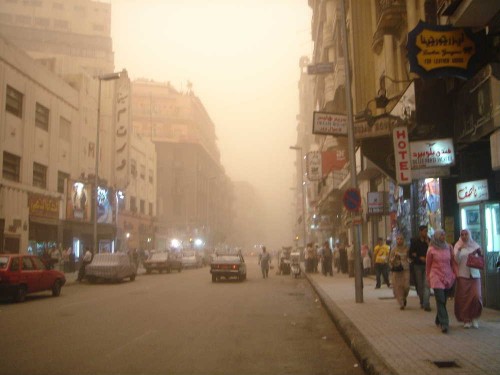 I had one of the oddest experiences of my life last Sunday night providing ‘dissent’ on trafficking for a BBC television world debate held at the kind of end-trafficking campaign event best compared to a religious revival meeting. Everyone else seemed happy to meld trafficking with sex trafficking with prostitution with slavery – at least they did not object to others who did it. We heard about disreputable women and sleazy motels without a peep from Gender Experts attending.
I had one of the oddest experiences of my life last Sunday night providing ‘dissent’ on trafficking for a BBC television world debate held at the kind of end-trafficking campaign event best compared to a religious revival meeting. Everyone else seemed happy to meld trafficking with sex trafficking with prostitution with slavery – at least they did not object to others who did it. We heard about disreputable women and sleazy motels without a peep from Gender Experts attending.
At the BBC debate, held outdoors in the Temple of Luxor, a sandstorm was just abating, it was freezing, armed security men abounded. One movie actress challenged my right to speak – I hope editors left that bit in, and my reply to her, which politely explained what the word debate means. She is UN goodwill ambassador for trafficking, Mira Sorvino (needs the word goodwill explained to her as well).
I went because it will be televised this weekend and eventually uploaded to the BBC World Debates website, about which I will advise. Meanwhile:
Laura Agustín, the Naked Anthropologist, on BBC World Debate: Can Human Trafficking Be Stopped?
held in the Temple of Luxor, Egypt, 12 December 2010, will be televised on the BBC World Service this weekend:
Times are GMT, although blocked from the UK (…) Available in rest-of-world for people whose cable television provides it; check programme guide for your country.
09:10 Sat 18 Dec 2010
22:10 Sat 18 Dec 2010
02:10 Sun 19 Dec 2010
15:10 Sun 19 Dec 2010
If anyone happens to see it, do let me know – I have not. Will be writing more about the experience anon. Here’s that wonderful setting again:
— Laura Agustín, the Naked Anthropologist


Hej Laura!
Well tried at Luxor, the lesson I learned is that 1 hour debates on complex subjects with over 20 speakers should be avoided!
The clue was in the maths- 2.5 million victims of human trafficking or 30 million? Having lived in Africa most of my 47 years I am painfully aware that employment conditions and salaries in the formal sector are often barely better than slavery so for me the figure is more like 1 billion! Fortunately so far, many Africans have maintained their contact with the traditional village and generally had the choice of dropping out of the economy and reverting to subsistence however this option is disappearing fast as land-grabbing pressures increase.
I was surprised that no-one brought up the underlying root causes of increased trafficking and exploitation- unprecedented discrepancy between “have’s and have nots”. This may probably best measured by total energy consumption patterns which according to Saul Griffith of http://www.wattzon.com ect ranges from less than 500w average in the “global south” to over 12500w in wealthy countries. I guess this gap is the biggest it’s ever been and under our current economic culture and model of greed is good; individual above community ect, human exploitation can only get worse.
Attempts to try and influence consumer choices in rich countries to reduce the impact of exploitation for cheap labour probably only shift the problem geographically with Africa clearly next on the list of mass cheap labour. The only long-term solution to equality and probably survival is for the “have’s” to reduce consumption levels because it is the demand which is driving the supply. How do you tell that to emerging societies? It’s a hard one but we could begin with a far more honest evaluation of the real cost of western consumption to the environment and peoples of Europe’s colonies who have ultimately made this all possible.
Rolf, Tärnsjö
The irony abounds.
Mira Sorvino won her only Oscar playing a sex worker in Woody Allen’s “Mighty Aphrodite”.
I did watch the debate and warmly congratulate you on providing even a modicum of balance and reason. Sadly, no-one raised the issue of our own culpability. Rich countries create many of the problems, and much of the illegality, by slamming their doors in the faces of those they hypocritically purport to help.
I just watched the program. As a viewer with some graduate familiarity with your work I didnt thing you did a very good job of making your point or translating it for those that did not understand it. In your concern with the micro situation of each individual case and circumstance you ended up making a disconnect between more structural contexts. You came across as aloof and angry, often pulling sneers and rolling your eyes. While no one could disagree that it is important to not conflate terms it is also important to not totally refute other points of view. You are not the all seeing, all knowing eye, rather you are an excellent researcher and anthropologist who is personally invested in the themes and focus of your work
I think your work is highly important however, imho in this instance, you needed to do a better job of not coming over as snobby and more correct than others. Structural violence is real and it does affect the choices in peoples lives. Hence nuance is needed as much your grand ethnographic experience. I would have liked to have seen you not get frustrated with the other pannelists and their arguments and instead explained your work clearly.
Sorry if this sounds overly harsh.
“think” might be a more appropriate word than “thing”.
I watched the debate this morning. I thought the premise of the debate lacked focus. Was it about trafficking, or slavery, or migrant labour – or all of that and more?
Without a clear focus it’s hard for any panel of participants to fully contribute in a way that raises the consciousness of the subject matter. Given that it was a debate for television and therefore subject to the vagaries of deadline, time limits and editing suite decision-making, the producers should have made sure it didn’t wander down all sorts of tangents.
That’s where the presenter should step in and take control. From my vantage point, it didn’t appear that was happening. Ms Badawi seemed unsure. Perhaps she was a little awe-struck by the presence of Hollywood actors in the crowd.